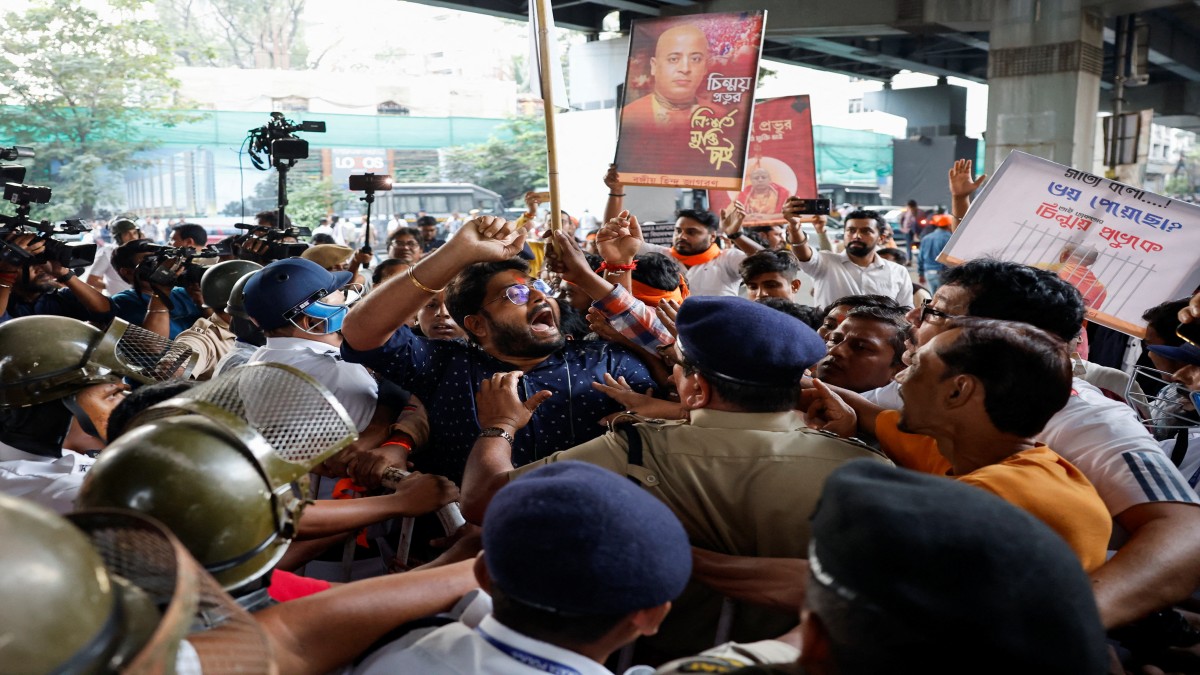) |
|
The recent escalation of tensions between India and Bangladesh has led to a significant development: a Kolkata hospital, J N Roy Hospital, has announced its refusal to treat patients from Bangladesh. This decision, announced on Friday, follows a series of events that have fueled anti-Bangladesh sentiment among certain segments of the Indian population. The catalyst for this drastic measure appears to be a confluence of factors, primarily the arrest of Hindu priest Chinmoy Das Prabhu in Dhaka on sedition charges, coupled with reports of alleged anti-Hindu violence and the purported desecration of the Indian national flag by Bangladeshi citizens. The hospital director, Subhranshu Bhakta, explicitly cited these incidents as the rationale behind the ban, emphasizing the perceived insults to India and calling on other hospitals to join the protest.
The actions of J N Roy Hospital are not an isolated incident. Renowned gynaecologist Indranil Saha preemptively announced his refusal to see Bangladeshi patients on social media, sharing an image of an allegedly desecrated Indian flag at BUET University as justification. This sentiment has extended beyond the medical community; West Bengal Assembly Leader of the Opposition Suvendu Adhikari publicly endorsed the boycott of Bangladesh, urging Indian businesses and citizens to show solidarity. This vocal opposition indicates a significant surge in anti-Bangladesh sentiment within India, driven by concerns over the safety and well-being of the Hindu minority population in Bangladesh and perceived disrespect towards India.
The underlying issue is the reported increase in attacks targeting the Hindu community in Bangladesh. Specific instances such as the vandalism of three Hindu temples in Chattogram highlight the fragility of religious harmony in the region. The Foundation for India and Indian Diaspora Studies (FIIDS) reports over 200 incidents of violence against Hindus in Bangladesh since August 5th, 2024. These attacks, coupled with the arrest of a prominent Hindu monk, Chinmoy Krishna Das, who openly advocated for minority rights, have intensified anxieties within India. The Indian government has officially voiced its concerns to Bangladesh, emphasizing the responsibility of the Bangladeshi authorities to ensure the safety and protection of all its citizens, including religious minorities.
The situation is further complicated by reciprocal accusations and concerns. Bangladesh has expressed concern regarding demonstrations targeting its diplomatic offices in Kolkata. This tit-for-tat escalation risks further damaging the already strained relationship between the two nations. The actions of the Kolkata hospital and the public pronouncements of support for the boycott highlight the deep-seated anxieties and tensions that are playing out in the public sphere. The refusal to treat Bangladeshi patients is a symbolic act with far-reaching implications, potentially impacting humanitarian aid and cross-border healthcare cooperation.
The underlying context is a long history of complex relations between India and Bangladesh. Shared history, cultural connections, and significant cross-border migration have always created a dynamic, sometimes fraught, relationship. While significant economic ties exist, the issue of the treatment of religious minorities in Bangladesh serves as a persistent source of tension. The current crisis brings this tension sharply into focus, demanding a careful consideration of the humanitarian implications of actions like the hospital’s decision to refuse treatment. The question remains: will this incident exacerbate existing tensions, or will it act as a catalyst for a more concerted effort to address the root causes of religious violence and discrimination in Bangladesh, ultimately improving relations between the two countries?
The response from the Indian government, while expressing concern, also highlights the delicate diplomatic balancing act involved. Direct condemnation could further escalate tensions, while inaction could be interpreted as indifference to the plight of the Hindu minority in Bangladesh. Moving forward, a nuanced approach is required, balancing the protection of Indian interests and the preservation of diplomatic ties with Bangladesh. International organizations and human rights groups also have a critical role to play in monitoring the situation, advocating for the protection of religious minorities, and promoting dialogue between the two countries. The future of India-Bangladesh relations hinges on finding a sustainable solution to address the underlying concerns of violence and discrimination, fostering an atmosphere of mutual respect and understanding.
The actions of individuals and organizations, such as the Kolkata hospital, illustrate the complex interplay of domestic politics, religious sentiment, and international relations. These events raise broader questions about the responsibility of nations to protect their citizens, both within their own borders and across international boundaries. The challenge lies in de-escalating tensions, addressing the root causes of the conflict, and promoting a dialogue focused on mutual respect and human rights for all citizens, irrespective of their religious affiliation. The immediate implications of the hospital's decision are significant, but the long-term consequences will depend on the diplomatic and political responses from both governments and the broader international community.
Source: Why a Kolkata hospital has refused to treat Bangladeshi patients
